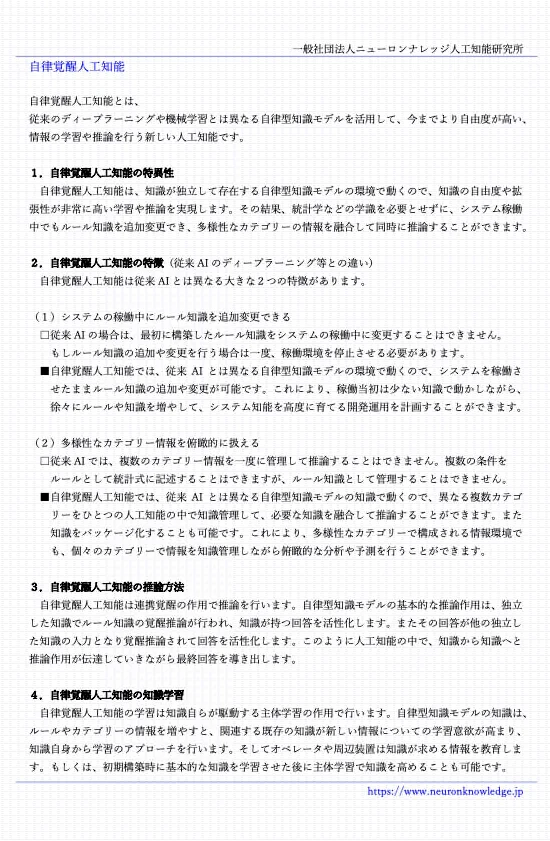このアーカイブは人工知能EXPOの論文発表パネルです。
自律覚醒人工知能(人工頭脳)の基礎理論Ⅰ(主体学習作用)2019年
神経覚醒型知識細胞による能動的意思推論人工知能モデルの実装と主体学習機能の実現
~人工頭脳の基礎理論(1)~
概要:神経覚醒型の知識細胞に能動的な意思属性を持たせることで,自律性人工知能の推論モデルを実装する.またその応用技術として,主体学習機能を実現する.自律性人工知能は,自己の意思で知識を進化させる事ができる脳型人工知能(人工頭脳)を可能にする.
Basic theory of artificial brain (1)
“Active intention inference by neural-awakening knowledge cell Implementation of artificial intelligence model and realization of subjective learning function”
Abstract: Implementing an inference model of autonomous artificial intelligence by having active intention attribute in the neural-awakening knowledge cell. In addition, as an applied technique, it realizes a subjective learning function. Autonomous artificial intelligence enables brain-type artificial intelligence (artificial brain) that can evolve knowledge by self’s intention.
.webp)
自律覚醒人工知能(人工頭脳)の基礎理論Ⅱ(感情推論作用)2020年
感情記憶と感情智識の神経覚醒細胞による能動型感情モデル高次元感情推論機能の実現
~人工頭脳の基礎理論(2)~
概要:神経覚醒型の智識推論モデルを,感情記憶と感情智識による感情作用の能動型感情推論モデルに拡張することで,人の感情作用に近い高次元の感情推論機能を実現する.感情推論は智識推論を修飾する修飾機能である.能動型感情推論人工知能は,感情を理解できる脳型人工知能(人工頭脳)を可能にする.
Basic theory of artificial brain (2)
“Realization of an active emotion model high-dimensional emotion inference function using neural memory of emotion memory and emotion wisdom”
Abstract: A high-dimensional emotion inference function close to human emotional action is realized by extending the neural arousal-type intellectual reasoning model to an active emotion inference model of emotional action based on emotional memory and emotional intelligence. Emotional reasoning is a modifying function that modifies knowledge reasoning. Active emotion inference artificial intelligence enables brain-type artificial intelligence (artificial brain) that can understand emotions.
.webp)
自律覚醒人工知能(人工頭脳)の基礎理論Ⅲ(意思推論作用)2021年
情報波の頭脳意思と知識活性の細胞意思による意思推論機能の実現(自律作用の可能性)
~人工頭脳の基礎理論(3)~
概要:神経覚醒型の智識推論モデルを,意思情報で意想偏意する推論環境に拡張することで,人の意思を反映した知識推論機能を実現する.頭脳意思は知識細胞の全てを意想偏倚するが,細胞意思は個々の知識細胞毎で意想偏倚する.自律意思を細胞意思として持つ人工知能は,自律作用を行う脳型人工知能(人工頭脳)を可能にする.
Basic theory of artificial brain (3)
“Realization of brain intention by information wave and intention reasoning by cell intention of knowledge activity (possibility of autonomous action)”
Abstract: By extending the nerve awakening type knowledge reasoning model to a reasoning environment that is biased by intention information, a knowledge reasoning function that reflects human intentions is realized. The brain intention biases all knowledge cells, but the cell intention biases each knowledge cell. Artificial intelligence that has autonomous will as cell will enables brain-type artificial intelligence (artificial brain) that performs autonomous actions.
.webp)
自律覚醒人工知能(人工頭脳)の基礎理論Ⅳ(自律意思作用)2022年
知識細胞の感情記憶からの感性形成と自律意思における自律推論と自律学習の実現
~人工頭脳の基礎理論(4)~
概要:神経覚醒型の智識推論モデルは、感情推論における感情記憶から感性知識を形成することで知識細胞に自律意思を生成する。自律意思は能動的な智識作用(心作用)の自律推論や自律学習を実現して、感性知識による自律意思作用の脳型人工知能(人工頭脳)を可能にする.
Basic theory of artificial brain (4)
“Formation of sensibilities from emotional memory in knowledge cells and realization of autonomous reasoning and autonomous learning in autonomous will.”
Abstract: The neural-awakening model of intelligent reasoning generates autonomous will in knowledge cells by forming sensory knowledge from emotional memories in emotional reasoning. The autonomous will realizes autonomous reasoning and autonomous learning of active wisdom action (mind action), and enables brain-type artificial intelligence (artificial brain) of autonomous will action by sensibility knowledge.
.webp)
Neuron Knowledge Artificial Intelligence Laboratory
Autonomous Awakening Cyberbrain
.png)
.png)

